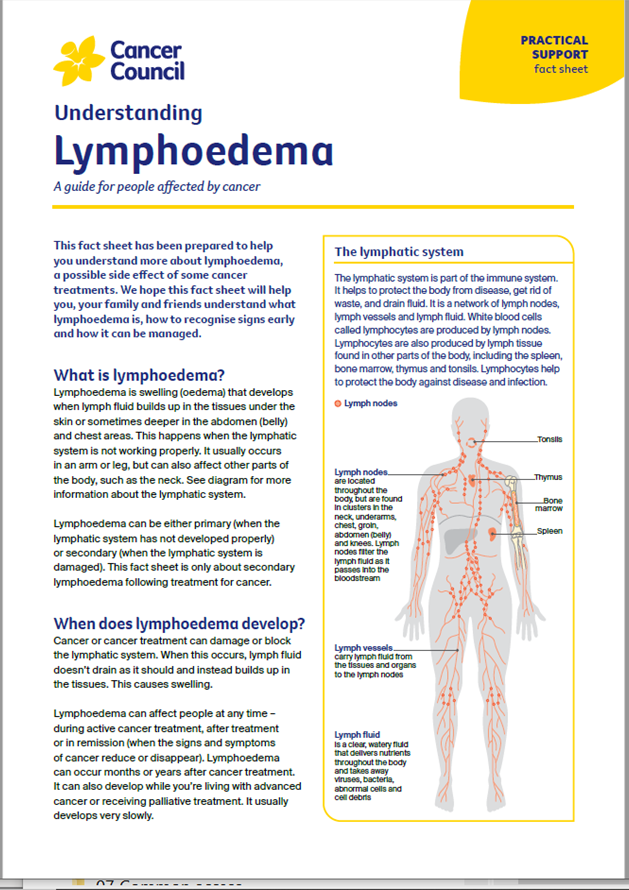- Home
- About Cancer
- Managing side effects
- Lymphoedema
- Reducing your risk of lymphoedema
Reducing your risk of lymphoedema
The risk of lymphoedema varies depending on the type of cancer, its stage and its treatment. Your doctor will talk to you about your risk. There are several things you can do to help reduce the risk of developing lymphoedema.
These suggestions are also useful for people living with lymphoedema. If you notice changes in the affected part of your body, see your doctor, lymphoedema practitioner or nurse immediately.
 Exercise regularly
Exercise regularly
- Keep physically active to help the lymph fluid flow. Any regular exercise (e.g. swimming, yoga, cycling or walking) is helpful, as are activities like gardening and housework.
- Doing strength (resistance) training is usually okay. Increase the weight and intensity gradually, and be guided by how your limb responds. Cool down slowly.
- Start any exercise slowly and build up gradually.
- Visit an accredited exercise physiologist or physiotherapist to develop an exercise program.
For more on this, see Exercise after a cancer diagnosis.
 Maintain a healthy body weight
Maintain a healthy body weight
- Aim to stay in a healthy weight range. Carrying extra weight can be a risk factor for developing lymphoedema. If you are carrying extra weight, talk to your doctor about how to achieve a healthy weight.
- Eat a variety of nutritious foods each day.
For more on this, see Nutrition and cancer.
 Move normally but avoid pressure and strain
Move normally but avoid pressure and strain
- Don’t try to protect the affected limb by limiting its movement – using the limb normally will keep the lymph fluid flowing.
- Avoid heavy lifting that may result in strain or injury, such as moving heavy boxes or furniture. This does not include exercise or strength (resistance) training.
- Avoid pressure from clothing, underwear and jewellery.
 Look after your skin
Look after your skin
- Keep your skin clean. Wash with a pH-neutral soap and avoid scented products.
- Moisturise your skin every day. Dry and irritated skin is more likely to tear and break.
- Protect your skin and cuticles – don’t cut your cuticles during nail care; wear gloves for gardening, housework and handling pets; use insect repellent to prevent insect bites; avoid cutting or burning your skin when cooking; wear protective clothing, a broad-brimmed hat, sunglasses and sunscreen when in the sun.
- Seek urgent medical help if you notice redness, heat, pain or think you may have a skin infection.
 Tips for travelling
Tips for travelling
Travel – by plane, train, bus or car – has not been shown to increase the risk of lymphoedema. Even so, you may choose to take simple precautions while travelling like wearing loose-fitting clothing, moving regularly and drinking plenty of water. People with lymphoedema, or who have had lymph nodes removed as part of cancer treatment, may be advised to wear a compression garment during long-distance travel. Talk to your lymphoedema practitioner or doctor before you go.
→ READ MORE: Diagnosing lymphoedema
Podcast: Coping with a Cancer Diagnosis
Listen to more of our podcast for people affected by cancer
Watch this video to see why eating well is so important after a cancer diagnosis, and what you can do to maintain a healthy diet.
Research shows that exercise benefits people with cancer during and after treatment. Find out more in this video or see our other exercise videos.
More resources
A/Prof Louise Koelmeyer, Director, Australian Lymphoedema Education, Research and Treatment (ALERT) Program, and Associate Professor, Macquarie University, NSW; Prof John Boyages AM, Founding Director and Honorary Professor at the ALERT Program, Macquarie University, NSW; Dr Nicola Fearn, Occupational Therapist and Accredited Lymphoedema Therapist, The Lymphoedema Clinic Wollongong, and Senior Research Officer, St Vincent’s Hospital Sydney, NSW; Jennifer Gilbert, Clinical Nurse Consultant – Lymphoedema, Icon Cancer Centre, Chermside, QLD; Megan Howard, Senior Physiotherapist and Lymphoedema Physiotherapist, Peter MacCallum Cancer Centre, VIC; Caitriona Nienaber, 13 11 20 Consultant, Cancer Council WA; Dr Amanda Pigott, Clinical Specialist Occupational Therapy, Princess Alexandra Hospital, QLD; Prof Neil Piller, Director, Lymphoedema Clinical Research Unit, College of Medicine and Public Health, Flinders University, SA, and Patron, Lymphoedema Association of Australia; Ashlynne Pointon, Consumer; Dr Cathie Poliness, Breast Surgeon, Peter MacCallum Cancer Centre, VIC; Tara Redemski, Senior Physiotherapist – Cancer and Blood Disorders, Gold Coast University Hospital, QLD.
View the Cancer Council NSW editorial policy.
View all publications or call 13 11 20 for free printed copies.

